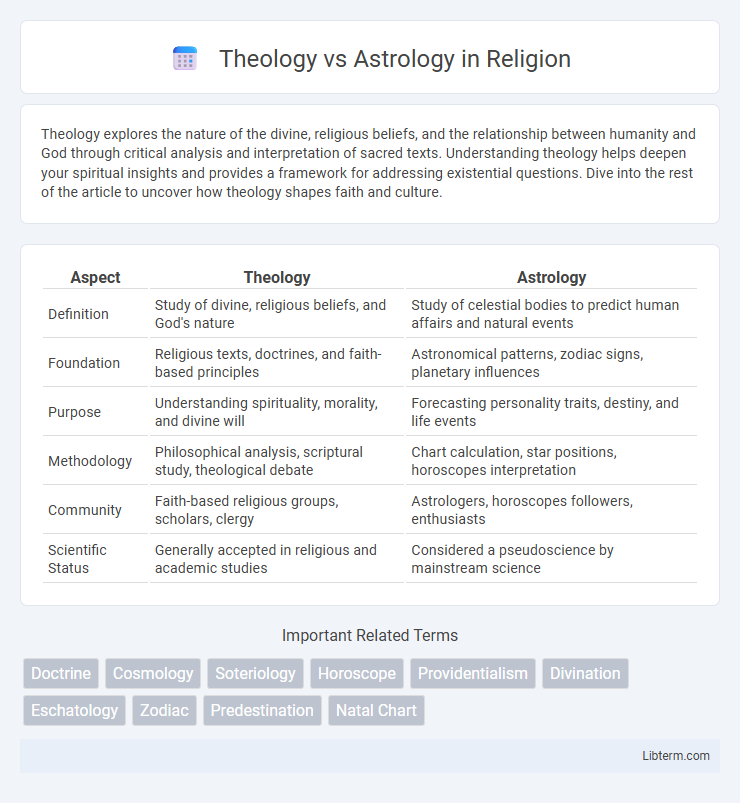Theology explores the nature of the divine, religious beliefs, and the relationship between humanity and God through critical analysis and interpretation of sacred texts. Understanding theology helps deepen your spiritual insights and provides a framework for addressing existential questions. Dive into the rest of the article to uncover how theology shapes faith and culture.
Table of Comparison
| Aspect | Theology | Astrology |
|---|---|---|
| Definition | Study of divine, religious beliefs, and God's nature | Study of celestial bodies to predict human affairs and natural events |
| Foundation | Religious texts, doctrines, and faith-based principles | Astronomical patterns, zodiac signs, planetary influences |
| Purpose | Understanding spirituality, morality, and divine will | Forecasting personality traits, destiny, and life events |
| Methodology | Philosophical analysis, scriptural study, theological debate | Chart calculation, star positions, horoscopes interpretation |
| Community | Faith-based religious groups, scholars, clergy | Astrologers, horoscopes followers, enthusiasts |
| Scientific Status | Generally accepted in religious and academic studies | Considered a pseudoscience by mainstream science |
Understanding Theology: Foundations and Principles
Theology systematically explores the nature of the divine, religious beliefs, and spiritual truths based on sacred texts, tradition, and reason. It establishes frameworks for interpreting moral principles, human purpose, and the relationship between God and humanity within various religious contexts. Unlike astrology, theology relies on faith and doctrinal study rather than celestial observation or predictive claims.
Defining Astrology: Origins and Core Concepts
Astrology, originating from ancient Mesopotamian civilizations around 3000 BCE, is the study of celestial bodies' positions and movements to interpret human affairs and natural phenomena. Core concepts of astrology involve zodiac signs, planetary influences, and horoscopes used to predict personality traits and future events. Unlike theology, which centers on divine beliefs and spiritual doctrines, astrology relies on symbolic correlations between the cosmos and earthly life.
Historical Intersections of Theology and Astrology
Historical intersections of theology and astrology reveal how ancient civilizations integrated celestial observations into religious doctrines and practices. For example, Mesopotamian priests used astrological charts to interpret divine will, influencing theological narratives in Judaism and early Christianity. Medieval scholars like Thomas Aquinas debated astrology's role within God's providence, blending astrological beliefs with theological frameworks.
World Religions’ Perspectives on Astrology
World religions exhibit diverse perspectives on astrology, with Christianity, Islam, and Judaism often viewing it as conflicting with core theological principles due to its deterministic implications and potential idolatry concerns. Hinduism and Buddhism incorporate astrology more integrally, using it for auspicious timing and spiritual guidance, reflecting a blend of metaphysical and religious thought. The theological debate centers on astrology's legitimacy as a spiritual science versus its classification as superstition, shaping religious adherents' acceptance or rejection of astrological practice.
Astrology in Sacred Texts and Doctrines
Astrology appears in various sacred texts and religious doctrines where celestial bodies are often interpreted as divine signals influencing human destiny and spiritual events. For example, ancient scriptures such as the Vedas and the Bible reference planetary positions and star patterns as significant to understanding God's plan or cosmic order. While theology primarily emphasizes divine revelation and faith-based truths, astrology integrates celestial phenomena with spiritual meaning, reflecting a longstanding intersection between cosmic observation and religious belief systems.
Key Differences: Faith-Based vs. Celestial-Based Beliefs
Theology centers on faith-based beliefs rooted in sacred texts and divine revelation, shaping religious doctrines and moral principles. Astrology relies on celestial-based beliefs, interpreting the influence of stars and planetary movements on human behavior and events. These fundamental differences highlight theology's focus on spiritual faith, whereas astrology emphasizes cosmic patterns and predictions.
The Influence of Astrology on Religious Thought
Astrology has historically influenced religious thought by shaping cosmological views and providing symbolic frameworks that many theological systems incorporate to explain human existence and divine order. Ancient civilizations often intertwined astrological signs with deities, attributing celestial movements to the will of gods, thereby reinforcing theological narratives. Modern theological discussions examine astrology's impact on spirituality, questioning its role in faith and divine revelation while exploring its cultural and historical significance within religious traditions.
Modern Debates: Theology vs. Astrology in Society
Modern debates between theology and astrology often center on their contrasting views of destiny and divine influence, where theology emphasizes faith-based doctrines and divine revelation, while astrology relies on celestial patterns and horoscopic predictions. Society grapples with the scientific validity of astrology, which is frequently challenged by theological perspectives that underscore spiritual truths grounded in scriptural authority. These discussions influence cultural attitudes, shaping public acceptance of astrology as either a metaphysical belief or a pseudoscience conflicting with established religious teachings.
The Role of Science in the Theology vs. Astrology Debate
The role of science in the theology versus astrology debate centers on the contrasting foundations of empirical evidence and faith-based beliefs. Theology often engages with metaphysical questions and spiritual doctrines that transcend scientific validation, while astrology is frequently critiqued for lacking empirical support and reproducible results in scientific studies. This divergence highlights how science emphasizes objective analysis and falsifiability, challenging astrology's claims, whereas theology accommodates supernatural elements beyond scientific scrutiny.
Personal Spirituality: Integrating Belief Systems
Theology examines personal spirituality through the lens of established religious doctrines, emphasizing faith and divine revelation. Astrology offers a framework for understanding individual identity and life events by interpreting celestial influences and planetary positions. Integrating these belief systems can enrich personal spirituality by combining theological insights with astrological self-awareness, fostering a holistic approach to inner growth.
Theology Infographic

 libterm.com
libterm.com